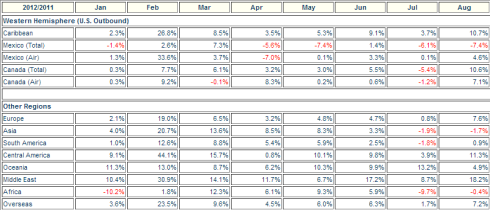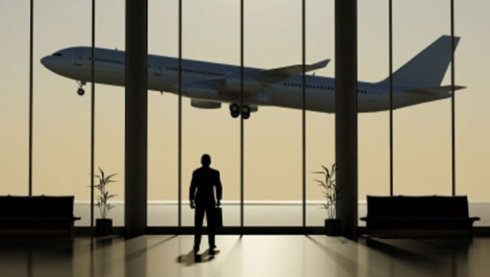U.S. Outbound Travel Forecast & Business Travel Prospects
November 23, 2012
Posted By: Manolis Psarros
TAGS:
business travel,
fiscal cliff,
market analysis,
outbound travel,
taxation,
U.S economy
Soon after it was officially announced that
U.S. international outbound travel has increased-with U.S. travel to overseas markets reaching 20.0 million until August, up 7 % this year- a new research from GBTA Foundation, analyzing the business travel impact of expiring tax cuts and automatic spending reductions – commonly referred to as the “fiscal cliff” –warns that if the U.S. economy falls over the “fiscal cliff,” it would have an immediate and severe
impact on U.S. business travel.
The
U.S. Office of Travel & Tourism Industries (OTTI) recently announced that U.S. international outbound travel was up 4% in August 2012, and up 3% for the year, with 42.2 million American travelers departing during the first eight months of 2012. U.S. travel to overseas markets reached 20.0 million, up 7 percent this year.

More specifically from the 47% of all U.S. outbound international travel, Europe received the largest share at 19%.
At the same time, a new research from the
Global Business Travel Association Foundation (GBTA) addresses a bid dilemma, showing that if the U.S. economy falls over the “fiscal cliff”, it would have an immediate and severe impact on
U.S. business travel and slash some $20 billion in travel. However, failure to address deficit spending also will have negative long-term effects.

The report models the potential business travel impact of two scenarios – one in which the fiscal cliff takes effect, and one where no changes are made to current tax and spending provisions.
- Fiscal Cliff Scenario: If the fiscal cliff occurs, the U.S. economy would enter a recession. This would lead to a total loss of $20 billion in spending on U.S. business travel over the next nine quarters – a 2.5% decline – and a reduction of 32 million business trips.
However, the elimination of tax cuts and reductions in federal spending would lead to reduced deficits and lower interest rates over the long run, resulting in business travel spending and an overall economy that grows more quickly after absorbing the shock of the fiscal cliff.
- No Fiscal Restraint Scenario: If all provisions of the fiscal cliff are eliminated or delayed indefinitely, business travel would experience more robust trip volume and spending as a result of stimulus from lower tax rates and continued government spending. In the near term, this scenario would lead to a cumulative loss of only 300,000 business trips and a gain of $5.5 billion in total business travel spending over the next nine quarters.
However, by 2014, much of the spending growth would be attributed to higher inflation. Larger budget deficits and growing debt will begin to take a toll, and business travel spending growth would continue to slow beyond the forecast horizon.
It is worth mentioning that according to a previous report by GBTA, American business travelers were expected to take 437.9 million trips this year, down 1.2% from an estimate made in April by the travel and meetings trade group. The outlook for next year was even worse, with the trade group lowering its forecast to 435 million trips, down 1.9% from April’s estimate. At the same time – due to higher prices- the trade group expected overall travel spending to rise 2.2% this year to $256.5 billion, and then increase another 4.7% next year to $268.5 billion.
More info: www.gbta.org,
OTTI.
 More specifically from the 47% of all U.S. outbound international travel, Europe received the largest share at 19%.
At the same time, a new research from the Global Business Travel Association Foundation (GBTA) addresses a bid dilemma, showing that if the U.S. economy falls over the “fiscal cliff”, it would have an immediate and severe impact on U.S. business travel and slash some $20 billion in travel. However, failure to address deficit spending also will have negative long-term effects.
More specifically from the 47% of all U.S. outbound international travel, Europe received the largest share at 19%.
At the same time, a new research from the Global Business Travel Association Foundation (GBTA) addresses a bid dilemma, showing that if the U.S. economy falls over the “fiscal cliff”, it would have an immediate and severe impact on U.S. business travel and slash some $20 billion in travel. However, failure to address deficit spending also will have negative long-term effects.
 The report models the potential business travel impact of two scenarios – one in which the fiscal cliff takes effect, and one where no changes are made to current tax and spending provisions.
The report models the potential business travel impact of two scenarios – one in which the fiscal cliff takes effect, and one where no changes are made to current tax and spending provisions.

COMMENTS
Dick Nguyen
Your information is really interesting. However, US travelers to Vietnam is still limited. The relation between Vietnam and the United States have been normalized and we really hope to welcome more and more US tourists to Vietnam so that we can understand each other more in order to increase our relationship and co-operation.